- Home
- Ian Fleming
Bond 08 - For Your Eyes Only Page 16
Bond 08 - For Your Eyes Only Read online
Page 16
‘It must be. He likes that sort of thing, I suppose?’
‘Oh yes.’ There was resignation in the laugh. ‘There’s a lot of the sultan in him. He gets quite impatient if he doesn’t get proper service. He says that when one’s worked very hard to get to the top of the tree one has a right to the best fruit that grows there.’ Mrs Krest found she was talking too freely. She said quickly: ‘But really, what am I saying? Anyone would think we had known each other for years.’ She smiled shyly. ‘I suppose it’s meeting someone from England. But I really must go and get some more clothes on. I was sunbathing on deck.’ There came a deep rumble from below-deck amidships. ‘There. We’re off. Why don’t you watch us leave harbour from the afterdeck, and I’ll come and join you in a minute. There’s so much I want to hear about London. This way.’ She moved past him and slid open a door. ‘As a matter of fact, if you’re sensible, you’ll stake a claim to this for the nights. There are plenty of cushions, and the cabins are apt to get a bit stuffy in spite of the air-conditioning.’
Bond thanked her, and walked out and shut the door behind him. It was a big well-deck with hemp flooring and a cream-coloured semicircular foam rubber settee in the stern. Rattan chairs were scattered about and there was a serving-bar in one corner. It crossed Bond’s mind that Mr Krest might be a heavy drinker. Was it his imagination, or was Mrs Krest terrified of him? There was something painfully slavish in her attitude towards him. No doubt she had to pay heavily for her ‘fairy-story’. Bond watched the green flanks of Mahe slowly slip away astern. He guessed that their speed was about ten knots. They would soon be at North Point and heading for the open sea. Bond listened to the glutinous bubble of the exhaust and idly thought about the beautiful Mrs Elizabeth Krest.
She could have been a model – probably had been before she became a hotel receptionist – that respectable female calling that yet has a whiff of the high demi-monde about it – and she still moved her beautiful body with the unselfconsciousness of someone who is used to going about with nothing, or practically nothing, on. But there was none of the chill of the model about her – it was a warm body and a friendly, confiding face. She might be thirty, certainly not more, and her prettiness, for it was not more than that, was still immature. Her best feature was the ash-blonde hair that hung heavily to the base of her neck, but she seemed pleasantly lacking in vanity about it. She didn’t toss it about or fiddle with it, and it occurred to Bond that she didn’t in fact show any signs of coquetry. She had stood quietly, almost docilely, with her large, clear blue eyes fixed almost the whole time on her husband. There was no lipstick on her mouth and no lacquer on her finger-nails or toenails, and her eyebrows were natural. Did Mr Krest perhaps order that it should be so – that she should be a Germanic child of nature? Probably. Bond shrugged his shoulders. They were certainly a curiously assorted couple – the middle-aged Hemingway with the Bogart voice and the pretty, artless girl. And there was tension in the air – in the way she had cringed as he brought her to heel when she had offered them drinks, in the forced maleness of the man. Bond toyed idly with the notion that the man was impotent and that all the tough, rude act was nothing more than exaggerated virility-play. It certainly wasn’t going to be easy to live with for four or five days. Bond watched the beautiful Silhouette Island slip away to starboard and made a vow not to lose his temper. What was that American expression? ‘Eating crow’. It would be an interesting mental exercise for him. He would eat crow for five days and not let this damnable man interfere with what should be a good trip.
‘Well, feller. Taking it easy?’ Mr Krest was standing on the boat-deck looking down into the well. ‘What have you done with that woman I live with? Left her to do all the work, I guess. Well, and why not? That’s what they’re for, ain’t it? Care to look over the ship? Fido’s doin’ a spell at the wheel and I’ve got time on my hands.’ Without waiting for an answer, Mr Krest bent and lowered himself down into the well-deck, dropping the last four feet.
‘Mrs Krest’s putting on some clothes. Yes, I’d like to see over the ship.’
Mr Krest fixed Bond with his hard, disdainful stare. ‘’Kay. Well now, facts first. It’s built by the Bronson Shipbuilding Corporation. I happen to own ninety per cent of the stock, so I got what I wanted. Designed by Rosenblatts – the top naval architects. Hundred feet long, twenty-one broad, and draws six. Two five-hundred-horsepower Superior diesels. Top speed, fourteen knots. Cruises two thousand five hundred miles at eight. Air-conditioned throughout. Carrier Corporation designed two special five-ton units. Carries enough frozen food and liquor for a month. All we need is fresh water for the baths and showers. Right? Now let’s go up front and you can see the crew’s quarters, and we’ll work back. And one thing, Jim,’ Mr Krest stamped on the deck. ‘This is the floor, see? And the head’s the can. And if I want someone to stop doing whatever they’re doing I don’t shout “belay” I shout “hold it”. Get me, Jim?’
Bond nodded amiably. ‘I’ve got no objection. She’s your ship.’
‘It’s my ship,’ corrected Mr Krest. ‘That’s another bit of damned nonsense, making a hunk of steel and wood a female. Anyway, let’s go. You don’t need to mind your head. Everything’s a six-foot-two clearance.’
Bond followed Mr Krest down the narrow passage that ran the length of the ship, and for half an hour made appropriate comments on what was certainly the finest and most luxuriously designed yacht he had ever seen. In every detail the margin was for extra comfort. Even the crew’s bath and shower was full size, and the stainless steel galley, or kitchen as Mr Krest called it, was as big as the Krest stateroom. Mr Krest opened the door of the latter without knocking. Liz Krest was at the dressing-table. ‘Why, treasure,’ said Mr Krest in his soft voice, ‘I reckoned you’d be out there fixing the drink-tray. You’ve sure been one heck of a time dressing up. Puttin’ on a little extra Ritz for Jim, eh?’
‘I’m sorry, Milt. I was just coming. A zip got stuck.’ The girl hurriedly picked up a compact and made for the door. She gave them both a nervous half-smile and went out.
‘Vermont birch panelling, Corning glass lamps, Mexican tuft rugs. That sailing-ship picture’s a genuine Montague Dawson, by the way…’ Mr Krest’s catalogue ran smoothly on. But Bond was looking at something that hung down almost out of sight by the bedside table on what was obviously Mr Krest’s side of the huge double bed. It was a thin whip about three feet long with a leather-thonged handle. It was the tail of a sting-ray.
Casually Bond walked over to the side of the bed and picked it up. He ran a finger down its spiny gristle. It hurt his finger even to do that. He said: ‘Where did you pick that up? I was hunting one of these animals this morning.’
‘Bahrein. The Arabs use them on their wives.’ Mr Krest chuckled easily. ‘Haven’t had to use more than one stroke at a time on Liz so far. Wonderful results. We call it my “Corrector” . ’
Bond put the thing back. He looked hard at Mr Krest and said: ‘Is that so? In the Seychelles, where the Creoles are pretty tough, it’s illegal even to own one of those, let alone use it.’
Mr Krest moved towards the door. He said indifferently: ‘Feller, this ship happens to be United States territory. Let’s go get ourselves something to drink.’
Mr Krest drank three double bullshots – vodka in iced consommé – before luncheon, and beer with the meal. The pale eyes darkened a little and acquired a watery glitter, but the sibilant voice remained soft and unemphatic as, with a complete monopoly of the conversation, he explained the object of the voyage. ‘Ya see, fellers, it’s like this. In the States we have this Foundation system for the lucky guys that got plenty dough and don’t happen to want to pay it into Uncle Sam’s Treasury. You make a Foundation – like this one, the Krest Foundation – for charitable purposes – charitable to anyone, to kids, sick folk, the cause of science – you just give the money away to anyone or anything except yourself or your dependants and you escape tax on it. So I put a matter of ten million dollars into t
he Krest Foundation, and since I happen to like yachting and seeing the world I built this yacht with two million of the money and told the Smithsonian – that’s our big natural history institution – that I would go to any part of the world and collect specimens for them. So that makes me a scientific expedition, see? For three months of every year I have a fine holiday that costs me just sweet Fatty Arbuckle!’ Mr Krest looked to his guests for applause. ‘Get me?’
Fidele Barbey shook his head doubtfully. ‘That sounds fine, Mr Krest. But these rare specimens. They are easy to find? The Smithsonian it wants a giant panda, a sea-shell. You can get hold of these things where they have failed?’
Mr Krest slowly shook his head. He said sorrowfully: ‘Feller, you sure were born yesterday. Money, that’s all it takes. You want a panda? You buy it from some goddam zoo that can’t afford central heating for its reptile house or wants to build a new block for its tigers or something. The sea-shell? You find a man that’s got one and you offer him so much goddam money that even if he cries for a week he sells it to you. Sometimes you have a little trouble with Governments. Some goddam animal is protected or something. All right. Give you an example. I arrive at your island yesterday. I want a black parrot from Praslin Island. I want a giant tortoise from Aldabra. I want the complete range of your local cowries and I want this fish we’re after. The first two are protected by law. Last evening I pay a call on your Governor after making certain inquiries in the town. Excellency, I says, I understand you want to build a public swimming-pool to teach the local kids to swim. Okay. The Krest Foundation will put up the money. How much? Five thousand, ten thousand? Okay, so it’s ten thousand. Here’s my cheque. And I write it out there and then. Just one little thing, Excellency, I says, holding on to the cheque. It happens I want a specimen of this black parrot you have here and one of these Aldabra tortoises. I understand they’re protected by law. Mind if I take one of each back to America for the Smithsonian? Well, there’s a bit of a palaver, but seeing it’s the Smithsonian and seeing I’ve still got hold of the cheque, in the end we shake hands on the deal and everyone’s happy. Right? Well, on the way back I stop in the town to arrange with your nice Mr Abendana, the merchant feller, to have the parrot and tortoise collected and held for me, and I get talking about the cowries. Well, it so happens that this Mr Abendana has been collecting the dam’ things since he was a child. He shows them to me. Beautifully kept – each one in its bit of cotton wool. Fine condition and several of those Isabella and Mappa ones I was asked particularly to watch out for. Sorry, he couldn’t think of selling. They meant so much to him and so on. Crap! I just look at Mr Abendana and I say, how much? No no. He couldn’t think of it. Crap again! I take out my cheque-book and write a cheque for five thousand dollars and push it under his nose. He looks at it. Five thousand dollars! He can’t stand it. He folds the cheque and puts it in his pocket and then the dam’ sissy breaks down and weeps! Would you believe it?’ Mr Krest opened his palms in disbelief. ‘Over a few goddam sea-shells. So I just tell him to take it easy, and I pick up the trays of sea-shells and get the hell out of there before the crazy so-and-so shoots himself from remorse.’
Mr Krest sat back, well pleased with himself. ‘Well, what d’you say to that, fellers? Twenty-four hours in the island and I’ve already knocked off three-quarters of my list. Pretty smart, eh, Jim?’
Bond said: ‘You’ll probably get a medal when you get home. What about this fish?’
Mr Krest got up from the table and rummaged in a drawer of his desk. He brought back a typewritten sheet. ‘Here you are.’ He read out: ‘ “Hildebrand Rarity. Caught by Professor Hildebrand of the University of the Witwatersrand in a net off Chagrin Island in the Seychelles group, April 1925” . ’ Mr Krest looked up. ‘And then there’s a lot of scientific crap. I got them to put it into plain English, and here’s the translation.’ He turned back to the paper. ‘ “This appears to be a unique member of the squirrel-fish family. The only specimen known, named the ‘Hildebrand Rarity’ after its discoverer, is six inches long. The colour is a bright pink with black transverse stripes. The anal, ventral and dorsal fins are pink. The tail fin is black. Eyes, large and dark blue. If found, care should be taken in handling this fish because all fins are even more sharply spiked than is usual with the rest of this family. Professor Hildebrand records that he found the specimen in three feet of water on the edge of the south-western reef” . ’ Mr Krest threw the paper down on the table. ‘Well, there you are, fellers. We’re travelling about a thousand miles at a cost of several thousand dollars to try and find a goddam six-inch fish. And two years ago the Revenue people had the gall to suggest that my Foundation was a phoney!’
Liz Krest broke in eagerly: ‘But that’s just it, Milt, isn’t it? It’s really rather important to bring back plenty of specimens and things this time. Weren’t those horrible tax people talking about disallowing the yacht and the expenses and so on for the last five years if we didn’t show an outstanding scientific achievement? Wasn’t that the way they put it?’
‘Treasure,’ Mr Krest’s voice was soft as velvet. ‘Just supposin’ you keep that flippin’ trap shut about my personal affairs. Yes?’ The voice was amiable, nonchalant. ‘You know what you just done, treas? You just earned yourself a little meeting with the Corrector this evening. That’s what you’ve gone and done.’
The girl’s hand flew to her mouth. Her eyes were wide. She said in a whisper: ‘Oh no, Milt. Oh no, please.’
On the second day out, at dawn, they came up with Chagrin Island. It was first picked up by the radar – a small bump in the dead level line on the scanner – and then a minute blur on the great curved horizon grew with infinite slowness into half a mile of green fringed with white. It was extraordinary to come upon land after two days in which the yacht had seemed to be the only moving, the only living thing in an empty world. Bond had never seen or even clearly imagined the doldrums before. Now he realized what a terrible hazard they must have been in the days of sail – the sea of glass under a brazen sun, the foul, heavy air, the trail of small clouds along the rim of the world that never came closer, never brought wind or blessed rain. How must centuries of mariners have blessed this tiny dot in the Indian Ocean as they bent to the oars that moved the heavy ship perhaps a mile a day! Bond stood in the bows and watched the flying-fish squirt from beneath the hull as the blue-black of the sea slowly mottled into the brown and white and green of deep shoal. How wonderful that he would soon be walking and swimming again instead of just sitting and lying down. How wonderful to have a few hours’ solitude – a few hours away from Mr Milton Krest!
They anchored outside the reef in ten fathoms and Fidele Barbey took them through the opening in the speed-boat. In every detail Chagrin was the prototype coral island. It was about twenty acres of sand and dead coral and low scrub surrounded, after fifty yards of shallow lagoon, by a necklace of reef on which the quiet, long swell broke with a soft hiss. Clouds of birds rose when they landed – terns, boobies, men-of-war, frigates – but quickly settled again. There was a strong ammoniac smell of guano, and the scrub was white with it. The only other living things were the land-crabs that scuttled and scraped among the liane sans fin and the fiddler-crabs that lived in the sand.
The glare from the white sand was dazzling and there was no shade. Mr Krest ordered a tent to be erected and sat in it smoking a cigar while gear of various kinds was ferried ashore. Mrs Krest swam and picked up sea-shells while Bond and Fidele Barbey put on masks and, swimming in opposite directions, began systematically to comb the reef all the way round the island.
When you are looking for one particular species underwater – shell or fish or seaweed or coral formation – you have to keep your brain and your eyes focused for that one individual pattern. The riot of colour and movement and the endless variety of light and shadow fight your concentration all the time. Bond trudged slowly along through the wonderland with only one picture in his mind – a six-inch pink fish with black stripes and
big eyes – the second such fish man had ever seen. ‘If you see it,’ Mr Krest had enjoined, ‘just you let out a yell and stay with it. I’ll do the rest. I got a little something in the tent that’s just the dandiest thing for catching fish you ever saw.’
Bond paused to rest his eyes. The water was so buoyant that he could lie face downwards on the surface without moving. Idly he broke up a sea-egg with the tip of his spear and watched the horde of glittering reef-fish darting for the shreds of yellow flesh among the needle-sharp black spine. How infernal that if he did find the Rarity it would benefit only Mr Krest! Should he say nothing if he found it? Rather childish, and anyway he was under contract, so to speak. Bond moved slowly on, his eyes automatically taking up the search again while his mind turned to considering the girl. She had spent the previous day in bed. Mr Krest had said it was a headache. Would she one day turn on him? Would she get herself a knife or a gun and one night, when he reached for that damnable whip, would she kill him? No. She was too soft, too malleable. Mr Krest had chosen well. She was the stuff of slaves. And the trappings of her ‘fairy-tale’ were too precious. Didn’t she realize that a jury would certainly acquit her if the sting-ray whip was produced in court? She could have the trappings without this dreadful, damnable man. Should Bond tell her that? Don’t be ridiculous! How could he put it? ‘Oh Liz, if you want to murder your husband, it’ll be quite all right.’ Bond smiled inside his mask. To hell with it! Don’t interfere with other people’s lives. She probably likes it – masochist. But Bond knew that that was too easy an answer. This was a girl who lived in fear. Perhaps she also lived in loathing. One couldn’t read much in those soft blue eyes, but the windows had opened once or twice and a flash of something like a childish hate had shown through. Had it been hate? It had probably been indigestion. Bond put the Krests out of his mind and looked up to see how far round the island he had got. Fidele Barbey’s schnorkel was only a hundred yards away. They had nearly completed the circuit.

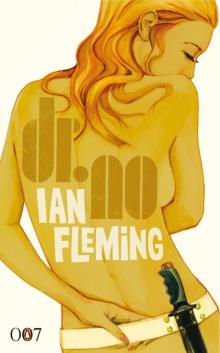 Doctor No
Doctor No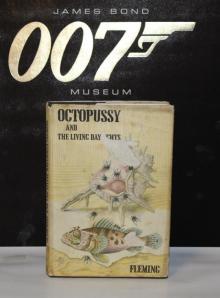 Octopussy & the Living Daylights
Octopussy & the Living Daylights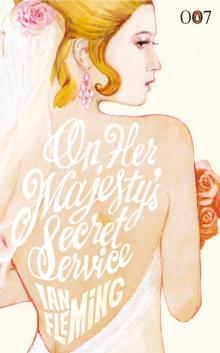 On Her Majestys Secret Service
On Her Majestys Secret Service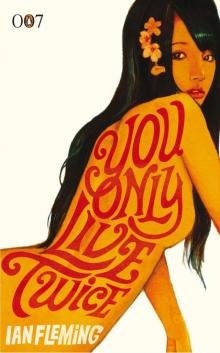 You Only Live Twice
You Only Live Twice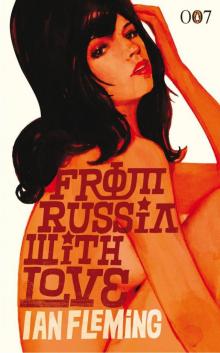 From Russia With Love
From Russia With Love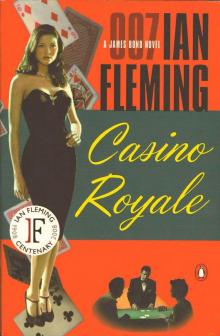 Casino Royale
Casino Royale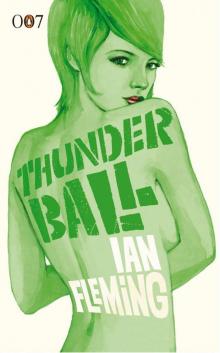 Thunderball
Thunderball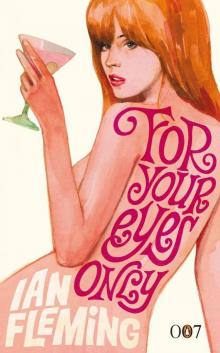 For Your Eyes Only
For Your Eyes Only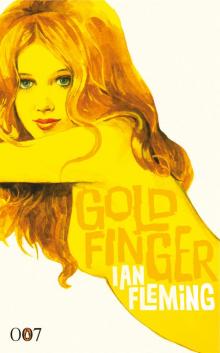 Goldfinger
Goldfinger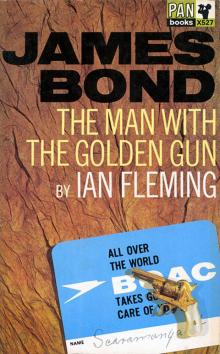 The Man With the Golden Gun
The Man With the Golden Gun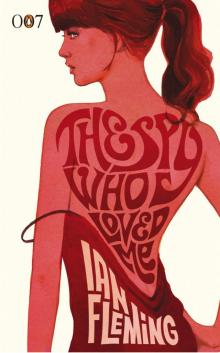 The Spy Who Loved Me
The Spy Who Loved Me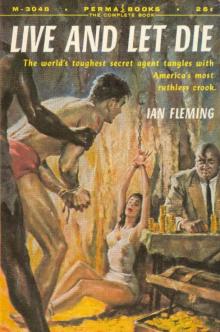 Live and Let Die
Live and Let Die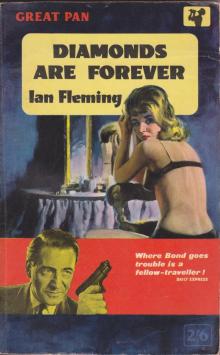 Diamonds Are Forever
Diamonds Are Forever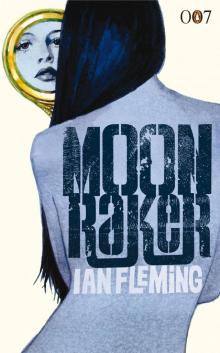 Moonraker
Moonraker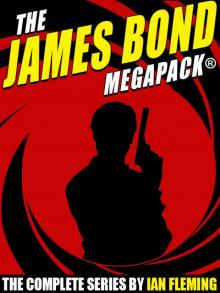 The James Bond MEGAPACK®
The James Bond MEGAPACK®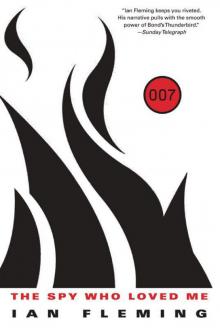 Bond 10 - The Spy Who Loved Me
Bond 10 - The Spy Who Loved Me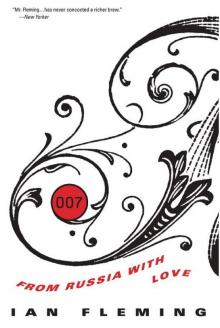 From Russia with Love (James Bond - Extended Series Book 5)
From Russia with Love (James Bond - Extended Series Book 5)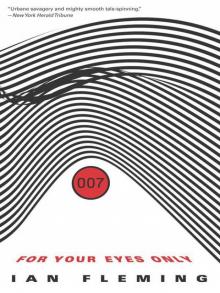 Bond 08 - For Your Eyes Only
Bond 08 - For Your Eyes Only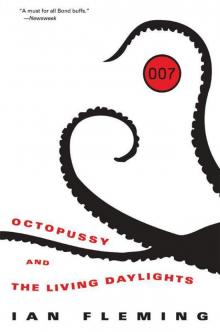 Bond 14 - Octopussy and the Living Daylights
Bond 14 - Octopussy and the Living Daylights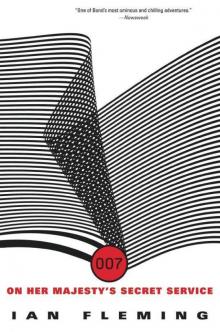 Bond 11 - On Her Majesty's Secret Service
Bond 11 - On Her Majesty's Secret Service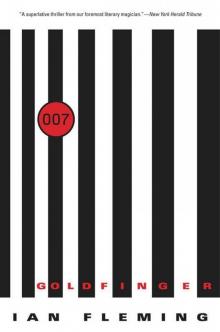 Bond 07 - Goldfinger
Bond 07 - Goldfinger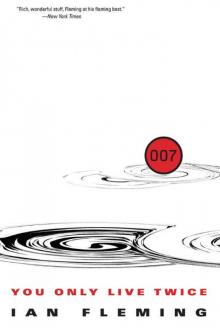 Bond 12 - You Only Live Twice
Bond 12 - You Only Live Twice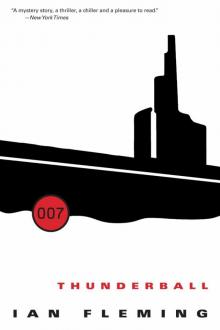 Bond 09 - Thunderball
Bond 09 - Thunderball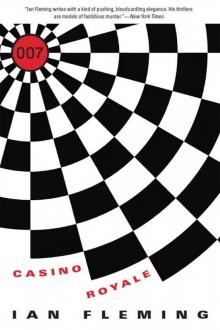 Bond 01 - Casino Royale
Bond 01 - Casino Royale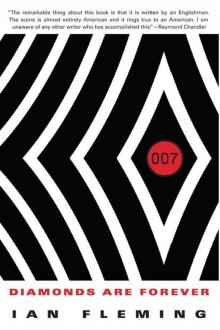 Diamonds are Forever (James Bond - Extended Series Book 4)
Diamonds are Forever (James Bond - Extended Series Book 4)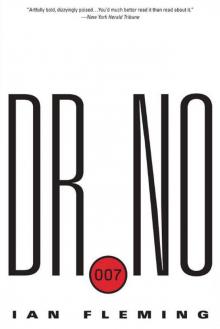 Bond 06 - Dr. No
Bond 06 - Dr. No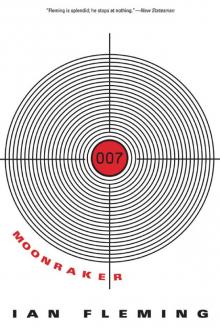 Moonraker (James Bond - Extended Series Book 3)
Moonraker (James Bond - Extended Series Book 3)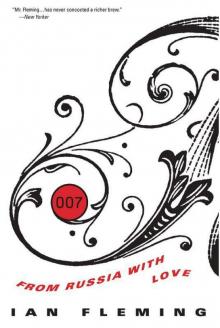 Bond 05 - From Russia With Love
Bond 05 - From Russia With Love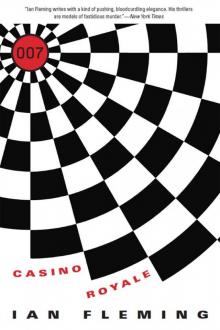 Casino Royale (James Bond - Extended Series Book 1)
Casino Royale (James Bond - Extended Series Book 1)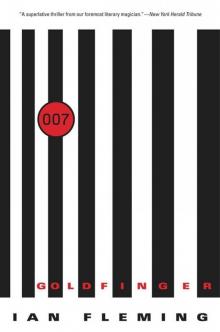 Goldfinger (James Bond - Extended Series Book 7)
Goldfinger (James Bond - Extended Series Book 7)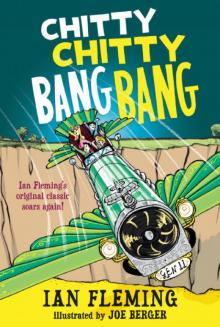 Chitty Chitty Bang Bang: The Magical Car
Chitty Chitty Bang Bang: The Magical Car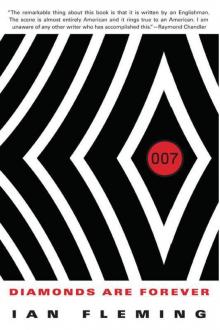 Bond 04 - Diamonds Are Forever
Bond 04 - Diamonds Are Forever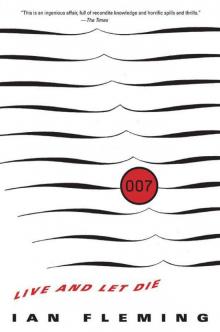 Bond 02 - Live and Let Die
Bond 02 - Live and Let Die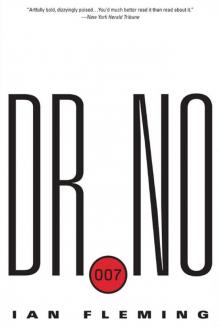 Dr. No (James Bond - Extended Series Book 6)
Dr. No (James Bond - Extended Series Book 6) The Hildebrandt rarity
The Hildebrandt rarity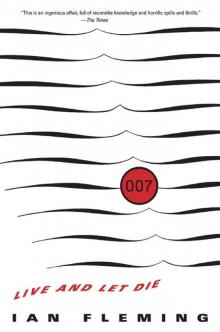 Live and Let Die (James Bond - Extended Series Book 2)
Live and Let Die (James Bond - Extended Series Book 2)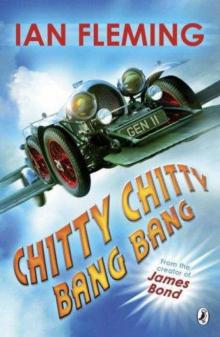 Chitty Chitty Bang Bang
Chitty Chitty Bang Bang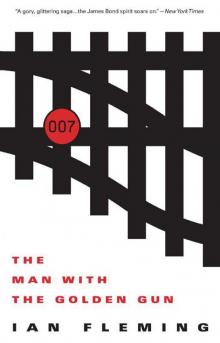 Bond 13 - The Man With the Golden Gun
Bond 13 - The Man With the Golden Gun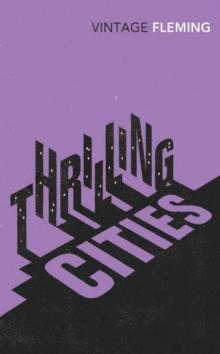 Thrilling Cities
Thrilling Cities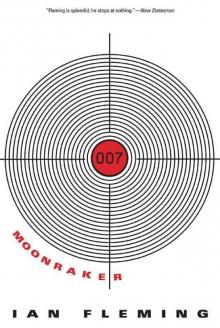 Bond 03 - Moonraker
Bond 03 - Moonraker